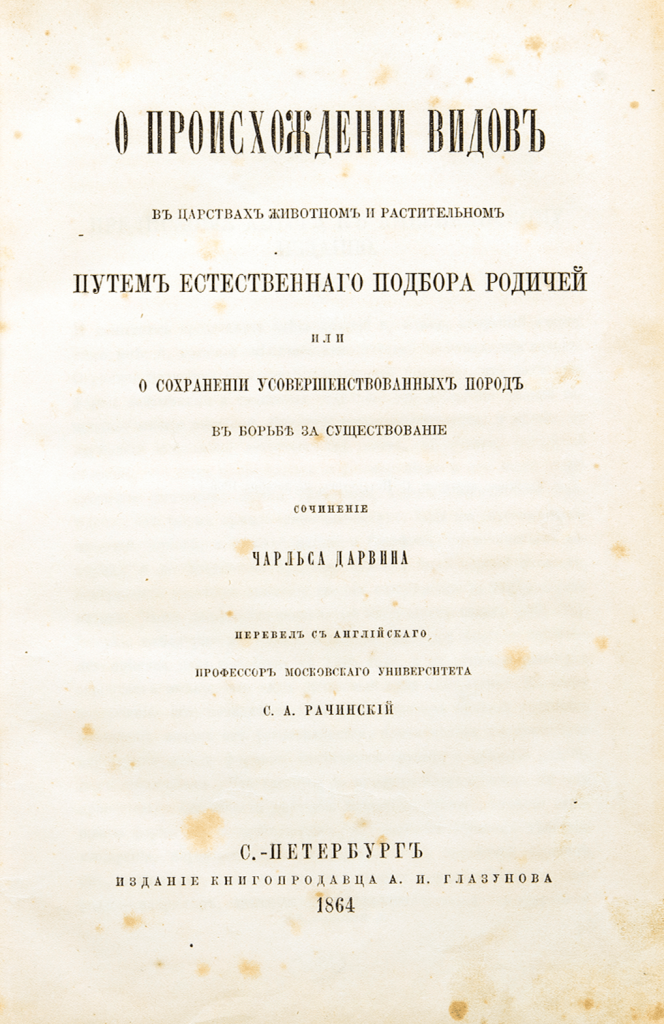By Brady Knox
On Monday, November 15, 2021 Dr. Brendan Mooney gave the final lecture in the fall colloquium series “Dostoevsky at 200” sponsored by the Havighurst Center for Russian and Post-Soviet Studies. In his fascinating lecture, “Going against the Grain: Dispelling the Myth of Dostoevsky’s Anti-Darwinism,” Mooney talked about Darwin and his reception in 19th century Russia broadly. Given his devout Christian faith, many scholars have argued that Dostoevsky was anti-Darwinist, pointing to a few quotes and concepts from his fiction as proof. However, Mooney made the case that if this supposed evidence is examined in context and if Dostoevsky’s non-fiction writings are examined, the claims that Dostoevsky was fundamentally anti-Darwinist are not entirely true. While refusing to go so far as to say that Dostoevsky accepted Darwinism, Mooney made a compelling argument that he did not reject it either.
Charles Darwin’s discoveries regarding evolution reached Russia rather quickly, triggering a debate among the leading intellectuals of the time. Most Westernizers and socialists immediately accepted the theory as true, along with figures such as Clemence Royer, Darwin’s first French translator, through whom Dostoevsky first encountered Darwin’s theory of evolution. Other figures, mainly conservatives and Slavophiles, were more reluctant to accept such a radical theory that overturned the previously accepted understanding that species were static. Others had no problem accepting the theory of evolution as it applied to animals, but fervently rejected applying it to humans. Nikolai Strakhov, a leading Pochvennichestvo (or native soil) writer, wrote a response to Darwin’s On the Origins of Species. While he regarded Darwin’s theory of evolution in regards to animals as deeply convincing, he firmly rejected the extrapolation of some thinkers, specifically Royer, in applying the theory to humans. He objected to the application of the theory to humans on the grounds that it reduced “human worth” by reducing man to a mere animal, something he found potentially dangerous. The ability to act independently of his environment had transformed man into something more than just an animal, and he had formed a positive moral system of equality based upon the principle not of viewing fellow humans as animals, but as people.
It is in this context that Dostoevsky was similarly introduced to Darwin. Dostoevsky, given his widely-known conservative and Pochvennichestvo views, was assumed by scholars to have shared the misgivings of some conservative figures. Mooney named scholars Michael Holquist and B.E. Lewis as falling into this view, likewise using a single allusion to Darwinism in Dostoevsky’s classic Notes from the Underground as evidence of Dostoevsky’s supposed anti-Darwinism. However, Mooney contended that interpreting the lines making allusions toward Darwinism in Notes from the Underground as anti-Darwin is taking them out of context. When read in its proper context, the narrator’s apparent reservations against Darwin–that imposing such a deterministic concept will undermine several things so important to human freedom and society–serve as a narrative device within the story itself, and cannot be taken as Dostoevsky’s definitive view. After all, Dostoevsky was known for espousing a great many ideas through his fiction, very few of which can be considered his actual view. For example, can anyone pretend that Ivan Karamazov’s atheism can be taken as Dostoevsky’s belief just because he wrote it? Furthermore, Notes from the Underground was published only after Darwin had published On the Origins of Species, not The Descent of Man. In the former, Darwin doesn’t discuss human evolution at all, that concept was first discussed in the latter. The picture regarding Darwin presented in Notes from the Underground is much more nuanced than previous scholars articulated.
The next relevant example comes from Crime and Punishment. A large number of scholars have interpreted the story as an explicit rejection of Darwinism or Social Darwinism. Before examining their claims in depth, Mooney went on a needed detour regarding Social Darwinism, in which he distinguished the “received” view, which stipulates that competition in human societies drive social progress, and the “revised” view, a descriptive view that seeks to understand the evolutionary biological basis of social phenomena. The two are not necessarily mutually exclusive.
The problem with the accepted scholarly view that Raskolnikov’s theory in Crime and Punishment is meant to be a critique of Darwinism and Social Darwinism is the fact that his theory does not match up with either of these views. Rather, his theory is meant to be a critique of nihilism, with no consideration towards Darwin.
The most compelling evidence for Mooney lies in Dostoevsky’s personal correspondence. While his writings express worry that Russians might rush ahead of the evidence to accept Darwin’s theory and base their morality on it, he does not seem all that concerned with human evolution. Taking a traditional Orthodox view of the controversy, Dostoevsky wrote: “Remember the contemporary theories of Darwin and others concerning the descent of man from monkeys. Without going into any theories, Christ explicitly declares that in man, in addition to an animal world, there is also a spiritual world. And what of it? Let him be descended from wherever you please (in the Bible it isn’t explained at all how God molded him from clay, took him from the earth). But God still breathed the breath of life into him (but it is bad that through his sins man can return again to being a brute).”
In the end, Mooney presented a compelling case, arguing persuasively that there is insufficient evidence to determine whether Dostoevsky was a Darwinist or anti-Darwinist.
Brady Knox is a senior majoring in Political Science and Russian, East European, and Eurasian Studies

